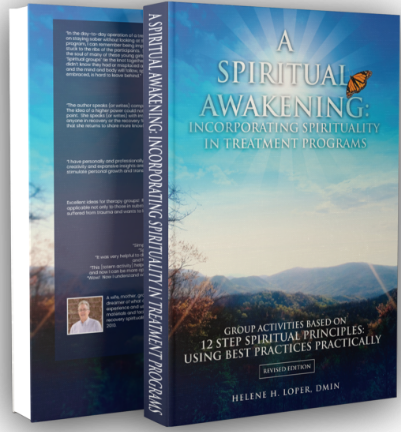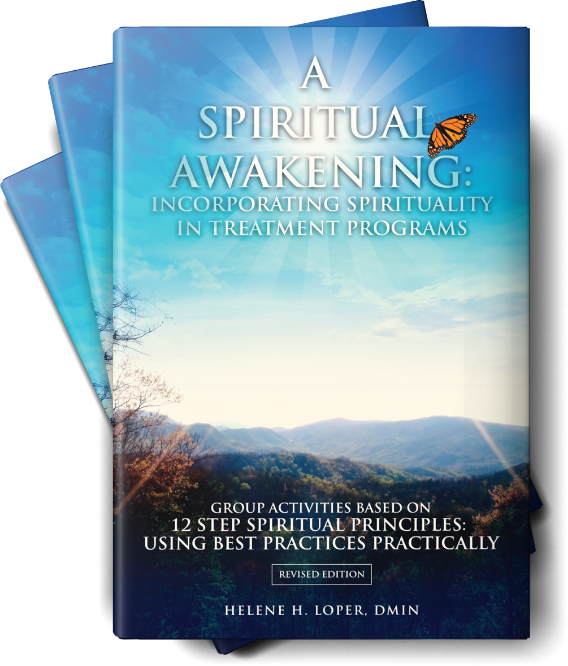Home

About Us
Summary
There are many treatment formats for addiction. One of the most effective is the 12 Step program developed by addicts for addicts. The 12 Steps are not a technique, they are a lifestyle of change through self-examination with the help of others using spiritual (not religious) principles. Treatment professionals may be trained in different models and have their own particular religious experiences. The professional challenge is to present spirituality ethically using best practices in group therapy settings. This collection of suggested group ideas is not exhaustive, but it offers a few insights for how therapy groups may be enriched with activities that illustrate some of the spiritual principles of 12 Step recovery. Drawing from human developmental theories, values clarification, motivational interviewing, meditation models, role play, and use of arts and metaphors, these groups provide creative educational and dialogic ways to present recovery principles in a therapeutic context. The core message is that recovery from addiction includes a spiritual awakening making spirituality a topic essential for holistic treatment and healing. This awakening is not just for addicts, it is a part of normal human development.
choose your
prefences

ABout THE AUTHOR
“In the day-to-day operation of a treatment program for adolescent girls, it is easy to focus on staying sober without looking at the teenager’s heart. As a consultant at such a program, I can remember being impressed about the way Rev. Loper’s ‘spirituality groups’ stuck to the ribs of the participants. She seemed to enable the opening of the heart and the soul of many of these young girls. Sobriety is one thing and healing may be another. ‘Spiritual groups’ tie the knot together, releasing strength and a self-reliance these girls didn’t know they had or misplaced as bullying and self-destructive behavior. Get the heart and the mind and body will follow, spirituality is a very powerful part of recovery that once embraced, is hard to leave behind.”
-Sheldon L. Rosenzweig, LPC, CCS
Tuscaloosa, AL
“The author speaks (or writes) compassionately from the heart in a very engaging way. The idea of a higher power could not be told in a better format. Clear, concise, and to the point. She speaks (or writes) with integrity to the twelve steps. This is a must read for anyone in recovery or the recovery field. Our residents gave her two thumbs up and hope that she returns to share more knowledge and wisdom.”
-Sarah Coleman
Wellness Director at the Foundry,
Steamboat Springs, CO
“I have personally and professionally interacted with Helene for over twenty years. Her creativity and expansive insights are therapeutically user friendly. Her group ideas stimulate personal growth and transformation.”
-Katie Reich, LCSW, BCD
Tuscaloosa, AL
Excellent ideas for therapy groups! Rev. Dr. Loper’s principles and methods are useful and applicable not only to those in substance use recovery, but also to anyone who has suffered from trauma and wants to learn healthier ways of thinking and communicating.
-Jackie Brodsky, Ph.D.
College of Communication and Information,
University of Kentucky
“Simple and straightforward.”
“Spoke about real stuff.”
“It was very helpful to discuss naming a God of MY understanding
and how it can look different.”
“This [totem activity] helped me to see myself as important in a group,
and now I can be more open-minded toward others who are different.”
“Wow! Now I understand why doing this [recovery] is so important to ME.”

A wife, mother, grandmother, pet lover and creative person, Helene is a dreamer of what could be. She has over thirty years of pastoral experience and using this creativity in liturgical resourcing, educational materials and facilitating interfaith dialogue. She began developing recovery spirituality groups for adolescents in residential treatment in 2010.

ABout THE BOOK
This book was born in the professional and recovery experiences of the author. Her approach is not an in-depth academic study but is primarily intended to share ideas from practical applications in life situations. Science, academic training, and theoretical best practices are given reality in the flesh and blood, sweat and tears, laughter, love and hard knocks of life. In the end, current science and technology cannot dissect or fully explain either our human bodies or our minds and spirits.Life and recovery are a journey of self-discovery, change, and life-long learning. A Spiritual Awakening is an invitation to engage in this process of discovery and becoming fully human by developing and using our uniquely human intellect and relational spirituality of the neocortex functions of love, compassion, interdependence, mutual respect, and capacity for problem solving in companionship and collaboration with one another.
CHAPTER ONE
Introduction To Spiritual Not Religious
My professional training has been as a pastor in a community that struggles with spiritual alienation and messages about God that have been hateful. Meeting the spiritual needs of my people as a pastor has led me to a deep appreciation of the process of faith development, which in turn has helped me to understand the spiritually healing nature of 12 Step programs. My personal experience with recovery has been in the Narcotics Anonymous program so I use NA materials in my examples. Other 12 Step literature may also be used where there is more familiarity or clarity in the principles being discussed. While I am by personal faith and ministry a Christian, I also respect the diversity of faith journeys expressed within interfaith movements. I have adapted multi-cultural dialogue training and skills for ministry locally in interfaith group collaboration. In these interfaith conversations I have learned more about what our faiths have in common, rather than debating theological differences.
This book is neither an academic thesis nor a scientific report or theoretical postulation. It proposes no theological system. It was born in the practical context of service in recovery creatively using things I have learned, found helpful and experienced personally.
These factors have shaped my approach to doing spirituality groups in therapeutic contexts. Whatever your own personal faith experience has been, if you are a professional therapist, you can also use your spiritual journey as an asset in discerning how to discuss the spiritual aspects with clients on the road to recovery. When reviewing your personal values and path to your own beliefs with awareness that others may have different paths and experiences, you are free to draw on a variety of spiritual practices, metaphors and traditions. Thus, you can offer your clients creative ways to find their own beliefs, values and spiritual paths without demanding conformity to any particular religious beliefs or practices.
CHAPTER TWO
Introduction To Spiritual Not Religious
Lorem ipsum dolor sit amet, consectetur adipiscing elit, sed do eiusmod tempor incididunt ut labore et dolore magna aliqua. Ut enim ad minim veniam, quis nostrud exercitation ullamco laboris nisi ut aliquip ex ea commodo consequat. Duis aute irure dolor in reprehenderit in voluptate velit esse cillum dolore eu fugiat nulla pariatur. Excepteur sint occaecat cupidatat non proident, sunt in culpa qui officia deserunt mollit anim id est laborum.
Sed ut perspiciatis unde omnis iste natus error sit voluptatem accusantium doloremque laudantium, totam rem aperiam, eaque ipsa quae ab illo inventore veritatis et quasi architecto beatae vitae dicta sunt explicabo. Nemo enim ipsam voluptatem quia voluptas sit aspernatur aut odit aut fugit, sed quia consequuntur magni dolores eos qui ratione voluptatem sequi nesciunt. Neque porro quisquam est, qui dolorem ipsum quia dolor sit amet, consectetur, adipisci velit, sed quia non numquam eius modi tempora incidunt ut labore et dolore magnam aliquam quaerat voluptatem. Ut enim ad minima veniam, quis nostrum exercitationem ullam corporis suscipit laboriosam, nisi ut aliquid ex ea commodi consequatur? Quis autem vel eum iure reprehenderit qui in ea voluptate velit esse quam nihil molestiae consequatur, vel illum qui dolorem eum fugiat quo voluptas.
nulla pariatur?
Sed ut perspiciatis unde omnis iste natus error sit voluptatem accusantium doloremque laudantium, totam rem aperiam, eaque ipsa quae ab illo inventore veritatis et quasi architecto beatae vitae dicta sunt explicabo. Nemo enim ipsam voluptatem quia voluptas sit aspernatur aut odit aut fugit, sed quia consequuntur magni dolores eos qui ratione voluptatem sequi nesciunt. Neque porro quisquam est, qui dolorem ipsum quia dolor sit amet, consectetur, adipisci velit, sed quia non numquam eius modi tempora incidunt ut labore et dolore magnam aliquam quaerat voluptatem. Ut enim ad minima veniam, quis nostrum exercitationem ullam corporis suscipit laboriosam, nisi ut aliquid ex ea commodi consequatur? Quis autem vel eum iure reprehenderit qui in ea voluptate velit esse quam nihil molestiae consequatur, vel illum qui dolorem eum fugiat quo voluptas nulla pariatur?


